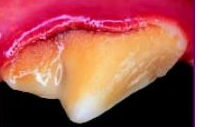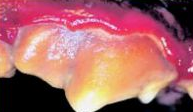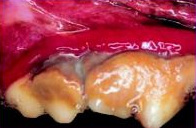Dental Health
Dental disease is one of the most common diseases among our pets. Chronic dental disease can burden the entire body as disease and infection in the mouth spreads to the rest of the organs, especially the heart, lungs and kidneys. dtlavets values your pet’s dental health and offers thorough cleanings performed under general anesthesia where subgingival cleaning and extractions can be performed.
How do I know if my pet has dental disease?
Bad breath, discolored or loose teeth, red or swollen gums, hesitance to play with chew toys and pain when eating can all be signs of dental disease.
Teeth are just the tip of the iceberg. Where there is only mild tartar or disease on the tooth, often there is more disease or infection hidden under the gumline or at the root. These areas cannot be assessed or treated without anesthesia. Generally, cleaning the surface of the tooth is purely cosmetic and does not address the remaining “hidden” disease.
-

Stage 1
-

Stage 2
-

Stage 3
-

Stage 4
I’m worried about the risks of anesthesia for my pet.
Just as in humans, there is a very small risk associated with general anesthesia. At dtlavets, we take specific precautions to minimize that risk as much as possible. Pre-anesthetic blood tests help us to choose the right anesthetic protocol for your pet. Intravenous fluids to support and stabilize the blood pressure and careful monitoring during the procedure, ensure a safer experience. It is extremely important to remember that if your pet has dental disease, the adverse effects on his/her overall health greatly outweigh the anesthetic risk for most patients.
What about non-anesthetic dental cleanings?
For some pets, this is an acceptable method to clean the tartar from the teeth, as long as it is done under the supervision of a veterinarian. When periodontal disease is truly only grade 1 or less, and the pet is amenable to it, this can be an acceptable way to maintain oral health. For pets with more significant tartar accumulation or any gingival disease, an anesthetic dental procedure is more appropriate.
How often will my pet need to have his/her teeth cleaned?
Every pet is different. On average most adult pets need a dental cleaning every year. But you can greatly influence how often your pet needs a dental cleaning by brushing their teeth frequently. Brushing is the single most effective thing that an owner can do to keep their pet’s mouth clean and healthy.